- Home
- M G Vassanji
The In-Between World of Vikram Lall
The In-Between World of Vikram Lall Read online
Contents
TITLE PAGE
DEDICATION
EPIGRAPH
MY NAME IS VIKRAM LALL.
PART 1
CHAPTER ONE
CHAPTER TWO
CHAPTER THREE
CHAPTER FOUR
CHAPTER FIVE
CHAPTER SIX
CHAPTER SEVEN
CHAPTER EIGHT
CHAPTER NINE
CHAPTER TEN
CHAPTER ELEVEN
PART 2
CHAPTER TWELVE
CHAPTER THIRTEEN
CHAPTER FOURTEEN
CHAPTER FIFTEEN
CHAPTER SIXTEEN
CHAPTER SEVENTEEN
CHAPTER EIGHTEEN
CHAPTER NINETEEN
CHAPTER TWENTY
PART 3
CHAPTER TWENTY-ONE
CHAPTER TWENTY-TWO
CHAPTER TWENTY-THREE
CHAPTER TWENTY-FOUR
CHAPTER TWENTY-FIVE
CHAPTER TWENTY-SIX
CHAPTER TWENTY-SEVEN
CHAPTER TWENTY-EIGHT
CHAPTER TWENTY-NINE
CHAPTER THIRTY
CHAPTER THIRTY-ONE
PART 4
CHAPTER THIRTY-TWO
AUTHOR’S NOTE
ABOUT THE AUTHOR
ALSO BY M.G. VASSANJI
ACCLAIM FOR M.G. VASSANJI’S THE IN-BETWEEN WORLD OF VIKRAM LALL
COPYRIGHT
For my father—
always vivid
whose absence inspired
“Who is the third who walks always beside you?”
T.S. Eliot, The Waste Land
“Neti, neti.” (Not this, not that.)
Brihadaranyaka Upanishad
“Po pote niendapo anifuata.” (Wherever I go he follows me.)
Swahili riddle; answer: shadow
MY NAME IS VIKRAM LALL. I have the distinction of having been numbered one of Africa’s most corrupt men, a cheat of monstrous and reptilian cunning. To me has been attributed the emptying of a large part of my troubled country’s treasury in recent years. I head my country’s List of Shame. These and other descriptions actually flatter my intelligence, if not my moral sensibility. But I do not intend here to defend myself or even seek redemption through confession; I simply crave to tell my story. In this clement retreat to which I have withdrawn myself, away from the torrid current temper of my country, I find myself with all the time and seclusion I may ever need for my purpose. I have even come upon a small revelation—and as I proceed daily to recall and reflect, and lay out on the page, it is with an increasing conviction of its truth, that if more of us told our stories to each other, where I come from, we would be a far happier and less nervous people.
I am quite an ordinary man, as you will discover, and moderate almost to a fault. How I came upon my career and my distinction is a surprise even to me. But my times were exceptional and they would leave no one unscathed.
PART 1.
The Year of Our Loves and Friendships.
ONE.
Njoroge who was also called William loved my sister Deepa; I was infatuated with another whose name I cannot utter yet, whose brother was another William; we called him Bill. We had all become playmates recently. It was 1953, the coronation year of our new monarch who looked upon us from afar, a cold England of pastel, watery shades, and I was eight years old.
I call forth for you here my beginning, the world of my childhood, in that fateful year of our friendships. It was a world of innocence and play, under a guileless constant sun; as well, of barbarous cruelty and terror lurking in darkest night; a colonial world of repressive, undignified subjecthood, as also of seductive order and security—so that long afterwards we would be tempted to wonder if we did not hurry forth too fast straight into the morass that is now our malformed freedom.
Imagine an outdoor mall, the type we still call a shopping centre there, a plain stubby strip of shops on open land, with unpaved parking in front. It was accessible from a side road that left the highway, less than a mile away, at the railway station. Far out in the distance, the farthest that you could see through the haze over the flat yellow plains, rose the steep green slopes of the great Rift Valley, down which both the railway and the highway descended to reach us at the floor. Behind us lay most of the rest of Nakuru, the principal town of our province.
My family ran a provision store at this Valley Shopping Centre, which was ten minutes’ walk from the Asian development where we lived. We sold Ovaltine and Milo and Waterbury’s Compound and Horlicks—how they roll past memory’s roadblocks, these trademarks of a childhood—and macaroni and marmalade, cheeses and olives, and other such items that the Europeans and the rich Indians who emulated them were used to. Beside us was a small bakery-café run by a Greek woman, Mrs. Arnauti, for the Europeans—as all the whites were called—who trundled down from their farms in their dust-draped vans and pickups to stop by for tea or coffee and colourful iced cakes and neat white sandwiches. Next to it was Alidina Greengrocers. On Saturday mornings, with the schools closed, my sister and I went down to the shop with our parents. Sun-drenched Saturdays is how I think of those days, what memory’s trapped for me: days of play. Though it could get cold at times, and in the morning the ground might be covered in frost. At the other end of the mall from us, Lakshmi Sweets was always bustling at midmorning, Indian families having stopped over in their cars for bhajias, samosas, dhokras, bhel-puri, and tea, which they consumed noisily and with gusto. By comparison our end was sedate, orderly: a few vehicles parked, a few rickety white tables outside Arnauti’s occupied by Europeans on a good day. My father and mother always ordered tea and snacks from Lakshmi, and my sister and I could go to Arnauti’s, where we were allowed a corner table outside, though not our black friend Njoroge, who with quite a straight face, head in the air and hands in his pockets, would proudly wander off.
After hastily consuming sticky Swiss rolls and doughy cheese or spinach pies, Deepa and I ran out to play. There were two handcarts outside the shop for pulling loads, one of them had its handle broken and no one usually minded when we took it out to give each other rides. Deepa, who was seven, ran along beside Njoroge and me, and habitually, in domineering big-brother fashion, I refused her a place in our conveyance, became annoyed at her for running after us, a girl in her two long pigtails and Punjabi pyjama and long shirt. She cried, and every time she did that Njoroge would give her a ride, obligingly push the cart for her all around the parking lot, and I believed they had more fun together than he had with me. That was why I thought he was in love with my sister. Every time I said that, Mother would have a fit, but she never objected to our playing with our friend.
One morning just before noon a green Ford pickup drove up and parked outside our store; from it emerged a tall and slim white woman, with brown curls to her shoulders and trousers that seemed rather broad at the hips. She had a long and ruddy face with a pointed chin. She paused to scrutinize the shops in the mall and, I thought, stared severely for a moment at me and my companions, before bending to say something to the two children who were in the passenger seat. The door opened on the other side and out tumbled a boy of my age and a young girl who could have been six; from the back jumped out with some flair an African servant—well dressed in expensive hand-me-downs, as the more favoured servants of the Europeans usually were, much to the envy of other servants. This one sported a brown woollen vest and a tweed jacket. The woman escorted her two children to Arnauti’s, where they sat at a table outside and in loud voices ordered from the waiter who had come running out to attend, and then she went over to my father’s shop. Soon our own barefoot servant hurried out to han
d the European woman’s servant a bottle of Coke.
When she had finished her shopping, her servant was called and he carried her two cartons of purchases to the back of the pickup. Then Mrs. Bruce, as was her name, returned to Arnauti’s patio and joined a table with two other women and a man. Her two children came out, where Njoroge, Deepa, and I, upon seeing them, now somewhat self-consciously continued our preoccupations with each other and our cart. The boy and girl stood quite still, outside the guardrail, staring at us.
Do you want a ride? I asked the boy suddenly.
Without a word he came and sat in the cart and we pushed him away at top speed with hoots and growls to simulate various engine sounds. When we stopped, after a distance, having gathered up a cloud of dust across the parking lot, the boy got out and dusted himself off as his sister whined, Now me, Willie, it’s my turn now.
He paid her no attention but shook Njoroge’s and my hands solemnly, saying, William—call me Bill, and pleased to meet you.
We shook hands wordlessly, then I pointed to my friend and said hesitantly: Njoroge.
That day Deepa and I stopped calling Njoroge by his English name. And I believe he also stopped using it for himself.
Now he in his turn pointed at me and said: Vic—Vikram.
Well then—jolly good, Bill said. Let’s give those two girls a ride—
He wore shorts of grey wool, with a rather fine blue checked shirt. His hair, like that of his sister, was a light brown. And both wore black shoes and white socks. The girl was in red overalls, and two ribbons of a like colour tied her hair in clumps at the back. We drove the two girls with speed right up to the line of shops, as they hung on, clutching for dear life, screaming with joy.
The boy and girl came every alternate week like clockwork, and we awaited them with anticipation, for they represented something out of the ordinary and exotic, and Bill was always imaginative and original in his play and Njoroge and I learned much from him. Sometimes we were a Spitfire raining bullets on enemies, other times a racing car, or an Empire Airways plane, or the Titanic or the QE2, or the SS Bombay, the boat that regularly plied the ocean between Bombay and Mombasa.
They had rather refined accents, their language sharp and crystalline and musical, beside which ours seemed a crude approximation, for we had learned it in school and knew it to be the language of power and distinction but could never speak it their way. Their clothes were smart; their mannerisms so relaxed. But these barriers of class and prestige were not so inviolable or cruel at our level, and we did become friends. Mrs. Bruce would drop them off at our shop first thing before going off for her other chores on the main street, and return an hour or so later.
Njoroge and Deepa continued to have that closeness, their bond of protector and dependent; I deferred to Bill, because he was a little older, and also because he simply was a leader in our midst.
And the girl?—her name was Annie, and I came to think I was in love with her, and she with me. Ours was a natural pairing. We found each other like magnets, and we could watch the world together with laughter in our eyes.
And so when flight captain William Bruce went bang-banging in his Spitfire, shooting down Germans or Japs or Eyeties as he self-propelled with his feet, and went tumbling over, the handcart dragging him ignominiously in the dust like a fallen charioteer, who should catch my eye than Annie, wrinkling her nose a few times in an expression of bemusement and glee, which I returned with a wide grin, before we rushed to Bill’s rescue and clucked appropriately at the grazed knees. And when the fisherman Njoroge, at Bill’s instigation, took Deepa out in his boat, Bill serenading with a mock guitar, Annie had slipped her arm casually in mine and we stood behind watching. So many such moments I could recall, gentle as dewdrops, transient and illusory like sunbeams; charming as a butterfly’s dance round a flower.
Much of my life has been a recalling of her; my Annie. Each remembered moment, each fresh thought like a bead in a rosary. How old would she be now, I’ve asked myself countless times, and provided an answer. Now she would be in her early fifties. What would she look like, what would her life have been like, would we have kept up that friendship. Would she still sing. Who could have guessed her fate, that darling of a privileged family, that bundle brimming with life and future and charm?…I go on and on.
My sister Deepa has always considered this proclivity of mine something of a sickness; Njoroge thought likewise, but showed some understanding of it. I do not deny the affliction. I never imposed it on those around me, I carried it like a private ache of no consequence to anyone but myself. Only lately have I admitted the obvious, that I let it deform me, freeze the essential core in me, so that for a large part of my adult life I remained detached from almost everything around me, explaining away this coldness as the result of a stoic, even mystical temperament.
She had freckles on her arms, and a few—exactly three, as I imagine it—on one side of her nose. And sometimes when she wore a dress her knickers might show, at which my sister would blink her eyelashes or look away in an almost unconscious response that I couldn’t help noticing. She was a burden to Bill, who either ignored her pleas or paid extravagant attention to her. She brought her dolls over sometimes, when Deepa and she would disappear, before tiring eventually and emerging to play with us boys. Once the servant, Kihika, had to walk around with Annie’s teddy bear in his hands so it could watch her play. This was evidently the aftermath of a recent tantrum. She, driven around in the cart by the rest of us, looking happily at my face, the tears now dry on hers; Kihika keeping pace, in his vest and tweeds, a tender smile on his face. It is a scene carved vividly in the brain, because it would return so often to tease and to torment.
One bright afternoon Mrs. Bruce stayed away an unusually long time, and my parents wondered whether someone should be sent to look for her. Lunch hour was passing, Alidina Greengrocers and Arnauti’s Café were already shuttered, Lakshmi Sweets was lifeless. Finally she arrived, two hours late, just when in a corner of the parking lot Bill, acting the part of a Special Branch inspector, toting a toy pistol he had brought along that morning, was administering a loyalty oath to the “uncovered” and “repenting” Mau Mau terrorist Njoroge, assisted by his faithful sergeant Vic and watched by an amused Kihika and the two girls. Bill’s other, outstretched hand profferred a chocolate as prize for the renunciation.
I shall be loyal to the Queen of all of the British Empire, Njoroge was mumbling,…and the dominions…I renounce the Mau Mau and the oath I have taken…if I give help to the terrorists may I die…
Mrs. Bruce had come out of the pickup and was walking toward us; suddenly she let out a terrifying shriek: Willie! Stop it at once! At once!
She had come to a trembling halt a few yards away; she uttered something inaudible and raised a hand to her forehead, closed her eyes. Kihika hurried over to steady her: Polé, mama, they got tired waiting, it’s only a game. Ni muchezo.
She went with him to our shop, she sat down and accepted a glass of cold water. Tears were running down her face.
I am sorry, Mrs. Bruce, said Papa. We all know him and will pray for him in his sorrow…
All of us children had gathered around in the shop and stood watching.
The cause of Mrs. Bruce’s grief was a piece of news she had received during her visit to the shops downtown, news that my parents had also apparently received in the meantime. Just over an hour ago, Mr. Innes, the manager of the chemists Innes and McGeorge, upon returning home from work, had discovered his wife and daughter hacked to death by the Mau Mau.
That was the closest that the killings had come to us.
Out in the distance, across the waters of Lake Ontario, the dim glow is the city of Rochester, I’ve been told, where Deepa now resides. The waves of this vast lake before us, under the midsummer night sky, produce a steady murmur, invoking for me the immensity of time and space, mocking the trivial rhythms of an ordinary human life and its perishable concerns. Yet that life is all we have and
is perhaps more than we think it is, for we continue in each other, as the arrival of my young visitor reminds me.
One of the cats suddenly nuzzles strongly against my leg, then just as abruptly ceases, vanishing somewhere; I think it’s the black one, Zambo, for whom this is the most but essential intimacy he’ll allow.
Oh, he’s gone, I mutter sheepishly, having reached out too late to stroke the cat.
There he goes, says Joseph, with a nod toward my back.
My young visitor has a surprisingly deep voice; his tall thin body with long black face rises like a silhouette before me in the dark. I’m still not sure why he agreed to come, what can he find here to interest and to keep him? He will start university in September, in Toronto. Meanwhile we are to be each other’s soulmates, as per instructions from Deepa, who has sent him to me to cool off. He had become involved in student activism back home in Kenya, a tempting and hazardous preoccupation, so I understand Deepa’s concern for him. You are his family there, Vic, said Deepa over the phone, drum some practical advice into him. Be his anchor when he needs you.
I’ll try, sis, I replied. A young man like that wants to do his own bidding, he is not going to heed the cautionary advice of some middle-aged Asian man. Especially someone like me. I am the notoriously corrupt, the evil Vic Lall, remember?
Don’t give yourself airs, she said. Besides, he’ll do you good.
Which balances the equation, I surmise. Joseph has his instructions too. When he arrived yesterday, when I picked him up at the train station in Korrenburg, he was respectful but reserved. We have yet to break that reserve, behind which may hide all his suspicion and distrust of me. What does he know, think of me?
He has been away from home a month now, and from what I understand, he left just in time to escape the clutches of the police following a large riot. He must hide a lot of anger too, at his world.
I remember the day he was born, Joseph, twenty-three years ago, a tiny wrinkled baby in the arms of his mother Mary, not quite black but, surprisingly to me, brown. I had gone to visit his mother in hospital, with my own three-year-old son in tow. The two of us stood together in rapt admiration. The years of the Mau Mau disturbances were long over; what were once termed terrorists were now called freedom fighters, and in the seventies, in Nairobi, we had daring robberies to occupy our minds, and political assassinations. Once in a while a former freedom fighter would emerge from the forests, or publish a memoir, aided by a foreign scholar. The happy scene in the hospital room that afternoon, though, belied a painful reality, for the boy’s father, my friend Njoroge, was not there.

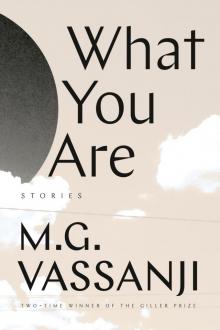 What You Are
What You Are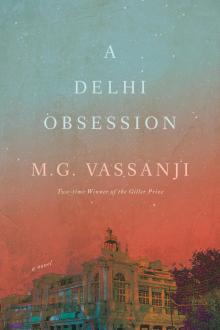 A Delhi Obsession
A Delhi Obsession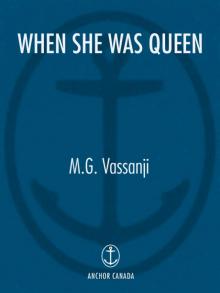 When She Was Queen
When She Was Queen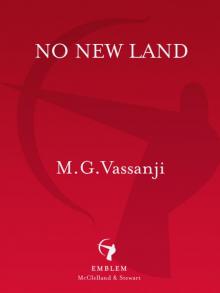 No New Land
No New Land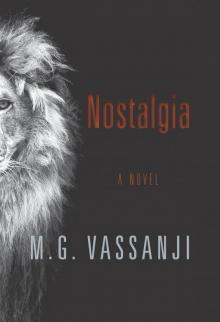 Nostalgia
Nostalgia Mordecai Richler
Mordecai Richler The Book of Secrets
The Book of Secrets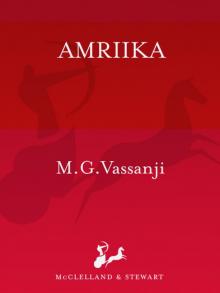 Amriika
Amriika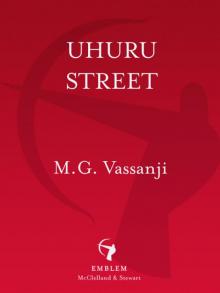 Uhuru Street
Uhuru Street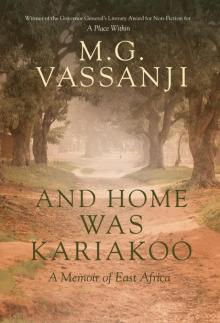 And Home Was Kariakoo
And Home Was Kariakoo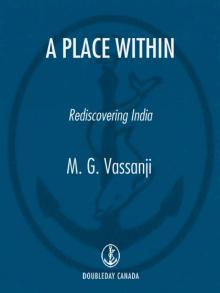 A Place Within
A Place Within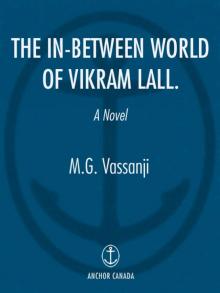 The In-Between World of Vikram Lall
The In-Between World of Vikram Lall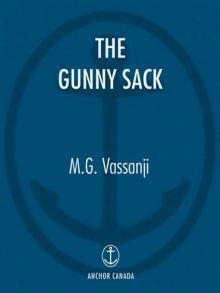 The Gunny Sack
The Gunny Sack